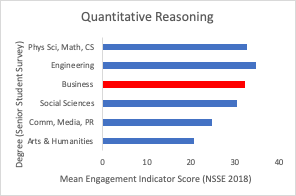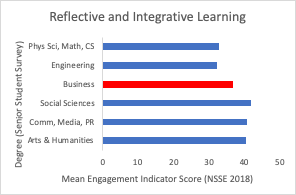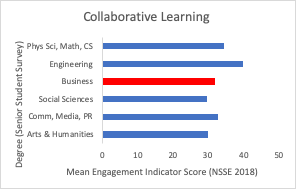Editor’s note: This blog was written in collaboration with my son Jeremy Lant who is a Biochemistry PhD student at Western University with a flair for writing and marketing. I asked him to find out if there was any data behind my observation that multidisciplinary digital marketing teams are highly effective.
Digital marketing is a profession that is always changing. Reaching customers online is like trying to fish in ever-shifting tide pools. Some pools are large, and some are small. Every day, the pools can change places, shrink, or grow. The bigger pools tend to have more fish, but not necessarily the fish you are looking for. You don’t want to waste time taking fish off your line who have no real interest in your business. So how do you keep up with it all, and build the best team to find the prospects who need your solution?
In the fishing analogy, a business student would be like someone who has been trained by experienced fishermen. They understand where the pools have been before, which fish normally hang out in which pools, and some good ways to attract the fish you are looking for. However, this approach has its limits. When pools change places, or fish change preferences, you need constant refreshment to keep up with where the fish are and how to get to them. This is where a diverse team can have a big impact. STEM students are masters of observation. They will develop new and efficient ways to track the fish you want and where they are moving. This is essentially data analytics. Other degrees like Arts and Social Sciences bring a different aspect to your search. They have an eye for writing and design and can keep things fresh with new ideas that look better to fish than the lures your competitors keep using.
Let’s look at what students are really learning from different university degrees, and how each set of skills might be a unique asset to your digital marketing team.
An excellent resource for evaluating the merits of different college degrees is the National Survey for Student Engagement (NSSE). The NSSE is an annual survey that profiles hundreds of colleges and universities in the United States in terms of student engagement. The NSSE defines ‘student engagement’ by two critical features: how much time students invest in their degrees, and how institutions deploy resources into different degrees. Let’s focus on the former because we are evaluating the students and not the colleges.
Now, there is a lot of data in the NSSE and I am not writing a PhD thesis (at least not in this article), so let’s continue to narrow things down. We will focus on degrees which are more likely to apply for a digital marketing job: Arts & Humanities, Communications/Media/PR, Social Sciences, Business, Engineering, and Physical Sciences/Math/Computer Science. Sorry biologists, nothing personal. I narrowed things further by picking two categories from the ‘academic challenge’ section, and one from the ‘learning with peers’ section which are most relevant to prospective employers.
When we get to the data plots, you will notice I have highlighted business in red for our baseline comparison. I have also ordered the degrees by my own perceived level of ‘mathi-ness’ to make the plots easier to look at.

First, let’s look at Quantitative Reasoning. Quantitative reasoning is, obviously, all about the numbers. The NSSE evaluates quantitative learning based on student’s perceived ability to generate, analyze, and criticize numerical information. These are the types of students that would excel in things like data analytics and search engine optimization (SEO). It is a powerful and unbiased approach to thinking, so let’s use it right now with some real data. You will notice that the ‘mathiest’ degrees take the win here. These are the data junkies, the uber nerds, the folks you want manning your best computer and producing numbers on what you need to know. The desire for STEM students in marketing is nothing new. In fact, all of these words are links to STEM-in-marketing articles.

Next up is Reflective and Integrative Learning. This category is based on student’s perceived ability to combine ideas from different courses, factor in diverse perspectives and societal issues, and be flexible in their perceptions. Basically, the ‘wokest of the woke.’ (Editor’s note: Woke in this instance means aware of and alert to social injustices.)
Students who excel in reflective and integrative learning have a deeper understanding of how people think, and how to put together a marketing campaign that is well received and genuine. This is becoming increasingly important and can help to avoid disasters like Pepsi’s infamous Kendall Jenner ad. As you can see, the winners here are Social Sciences, Arts, and Communications degrees. These are the best degrees to hire for jobs like writing, editing, and design. Graduates of these degrees will help keep your company hip and in the know about what is cool and, more importantly, appropriate in marketing.

Lastly, let’s look at collaborative learning. The NSSE evaluates collaborative learning based on how often students work together in groups or offer help to their peers. The value of this to an employer is obvious, you want a team that meshes well when multiple people are needed for a job. As a mechanical engineer by training, I can proudly say that engineers kicked everyone else’s butt in this one. This may come as a surprise to some. Indeed, movies always depict the ‘engineer’ as a recluse nerd with no social abilities. But this could not be further from the truth. In actuality, engineering, math, and the physical sciences are so absurdly difficult that students have no choice but to band together. Students in these fields are highly accustomed to group work and develop effective skills in splitting tasks efficiently and synergistically getting the job done. If you need a ‘task force’ to take on something extra challenging, like a new data analytics platform or a super-optimized search algorithm, STEM fields are the way to go.
Now let’s bring it all together and build the ‘dream team’ of digital marketing. I am going to bring the fishing in tide pools analogy back around because I think it is fun. First, you have to find out where the fish are and how their patterns are changing. For this you want a solid team of STEM and business students to work on your data analytics and SEO platforms. STEM students work well together so do not be afraid to team them up. Next, you need some expertly trained fishermen to ‘tack the lines’ and my analogy is a little weak in this part so let’s just say get some business students to put together the main ad/marketing strategy for your client. Lastly, call up your arts/communications/social sciences pro to fine-tune your fishing strategy and make a successful lure. In other words, post-production editing, writing, and design to make sure your ad is original and genuine. With all of these things in mind, you will have a strong competitive advantage against the other guys who just hire fishermen.
As a final note, it is important to also consider the individual skills of your applicants. Some Arts students can code, and some engineers are excellent artists. Understanding applicants’ strengths not only based on their degrees, but also their independently acquired skills is the best way to determine where they fit on your team.
Take advantage of our multidisciplinary team of engineers, artists and business experts at Collingwood Marketing for your next project!


Recent Comments